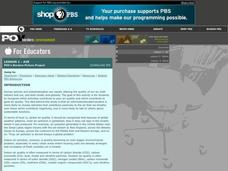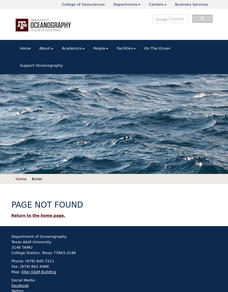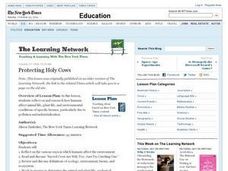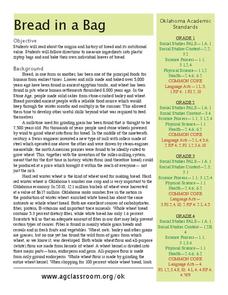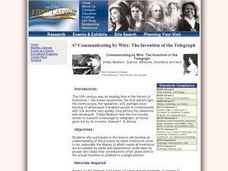Curated OER
Environmental Changes
High school scientists reasearch and illustrate changes in the local environment and consider relationships among agriculture, industry, economy, natural events, and social interactions. They construct a timeline to discover if there are...
Curated OER
Industrial Revolution in America: Exploring the Effects of the Heat Engine on the Growth of Cities
Eighth graders examine the reasons for the growth of cities in North American. Using the internet, they research the causes and effects of the Industrial Revolution and determine if the growth of cities is a sign of progress. They...
Curated OER
P.O.V.'s Borders Picture Project: Lesson 1 - Air
Take photos of human activities that impact air quality. Collaborative groups present one of the photographs, identifying how the activity contributes to air quality and what can be done to minimize the impact. As one in a series of...
Curated OER
Fisheries
Students research and report on the ocean's problems of disappearing or diminishing species around the world. students examine ecosystems and food chains and present their findings to a mock panel of science experts.
Curated OER
Concrete for Kids
Although preparation-intensive, this would be an unforgettable experience in materials engineering. Stimulate learners' curiosity with a slide show and then introduce them to the components of concrete. Small groups mix and pour concrete...
Curated OER
Protecting Holy Cows
Young scholars study the interrelationships of organisms and their environments. They study ecological communities and determine what is necessary for survival. Students discuss and answer questions concerning a group's biome, habitat,...
Curated OER
Cooperative Conjectures
Pupils compare and contrast how animals have coexisted with humans. They also identify industrial changes and how animals were affected. They use the internet to research information and present their findings to the class.
American Chemical Society
Man and Materials Through History
From the start of the Industrial Revolution, it only took 147 years for someone to invent plastic. This may seem like a long time, but in the history of inventing or discovering new materials, this is incredibly fast. An informative and...
National Institute of Open Schooling
Water Pollution
Fifteen million children under the age of five die each year due to diseases in their drinking water. Water pollution is the topic of lesson 34 in the series of 36. Scholars, through reading and discussing, study numerous aspects of...
California Academy of Science
Pollution in Our Watershed
The concept of a how pesticides and other chemicals pass through a watershed can be difficult for younger learners to grasp without a concrete example. In the activity here, some blank paper, markers, and a spray bottle are all you need...
Curated OER
History's Thermometers
Ancient coral beds give scientists clues to past ocean temperatures in much the same way that tree rings indicate historical weather conditions. High school scientists examine coral oxygen isotope ratios and plot the data as a function...
Curated OER
Bread in a Bag
Could the history of bread really be interesting? Yes, it could! An informational text gives scholars wheat production background from 8,000 years ago, discussing different types of bread and the current industry in Oklahoma. Learners...
Baylor College
The Variety and Roles of Microbes
Mini microbiologists play a card game in which they group microorganisms by groups: virus, fungus, protist, or bacteria. Then they identify the roles different microbes play in the natural world and explore how humans effectively use...
Institute of Electrical and Electronics Engineers
Can You Copperplate?
Introduce emerging engineers to the process of metal plating. This resource provides background reading on chemical engineering, plating, and corrosion. It concludes with a copper plating activity. The standards alignment list includes...
Curated OER
People Cause Pollution
Students investigate the effects of industry on natural features. They discuss the industrial revolution, and create a drawing of a river with one half illustrating pre-industrial revolution time, and the other half representing the...
Curated OER
Conservation for the Ages
Students use the Internet to research a topic about energy conservation. They summarize the research information in an original studenT book and visit a local elementary school to present their projects.
Curated OER
Mining and Safety in Illinois
Students answer questions that are related to factors that determine the type of mining used? They are able to answer questions after reading the assignment. Some questions that are asked: Briefly describes the steps of surface mining....
National First Ladies' Library
Eli Whitney: A Top Ten Inventor?
Students conduct research and present their findings in a persuasive manner. Then they work in groups to enhance the development of cooperative work skills. Students also present their findings through persuasive skills in writing and/or...
Curated OER
Chilean Sea Bass
Introduce your mini-marine biologists to using databases. Tables of how many Chilean Sea Bass were caught and number of hours spent fishing are examined. Using the data, individuals calculate the "Catch per Unit of Effort" for each year....
NOAA
Sustaining Our Ocean Resources
Lead young scientists on an investigation of fishery practices with the final installment of this four-part unit. Using a PowerPoint presentation and hands-on simulation, this activity engages children in learning how fish populations...
Curated OER
Social Studies: Reasons Diseases become Epidemic
Students identify reasons diseases become epidemic and list them in web format. They explore additional questins to to better investigate the time periods mentioned: 14th century, America at contact and the Age of Industry.
Curated OER
GEOGRAPHY: SPACE CENTERS
Students examine the descriptive science dealing with the surface of Earth, its division into continents and countries, climate, natural resources, inhabitants and industries of the various divisions and analyze the political geography...
Space Awareness
Let's Break the Particles
Build learning by breaking atoms! Young scientists study the way energy changes with a hands-on activity. As they roll steel marbles down a ramp, learners test the hypothesis that kinetic energy does not go away with friction or...
Curated OER
Career Exploration
Students investigate possible career paths in forestry they may pursue. In this vocational instructional activity, students discover the many careers possible in the world of science by researching teacher approved career websites on...
Other popular searches
- Industrial Age 1865 1914
- Second Industrial Age
- New Industrial Age
- Industrial Age in America
- Industrial Age England
- The Industrial Age
- Immigration Industrial Age
- United States Industrial Age
- The Early Industrial Age
- Early Industrial Age
- America's Industrial Age




